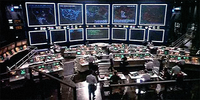-
Designing a more effective crystal ball
A new model for crowdsourcing predictions called Aggregative Contingent Estimation System (ACES) is transforming the way future events are forecast — combining the collective knowledge of many individual opinions in a unique way that improves accuracy beyond what any one person or small group of experts could provide
-
-
Anxious Searchers Miss Multiple Targets
Research shows that when people search for objects — say, air port security personnel screening baggage for weapons — they typically miss the second of two objects once they find the first one; missing a second target is a well-known issue called “satisfaction of search,” and it manifests itself in both airport screening and looking for cancerous tumors in a lab; now researchers find that anxiety heightened the satisfaction-of-search problem
-
-
Suicide bombers: expedient tactics, not expression of Islam

New study argues that female suicide bombing is a political and military tactic, not a religious act; according to mainstream scholars of Islam, the Qur’an, the Hadith (traditions and practices of the Prophet Muhammad), and other principles of Shari’a (Islamic law) clearly condemn terrorist acts and oppose suicide operations; in order to justify suicide bombings, leaders of Hamas, Palestinian Islamic Jihad (PIJ), and al Qaeda have formulated their own interpretations of Islam, which are based more on military strategy than theology
-
-
DHS completes tests on mind reading technology

DHS officials recently completed an initial round of tests for its new intent detecting technology; with the Future Attribute Screening Technology (FAST) program, DHS hopes to be able to identify terrorists or criminals before they execute an attack; FAST relies on remote sensors to measure several physical indicators like heart rate and how frequently one’s eyes flit back and forth; so far the technology has only been tested in a laboratory setting, but DHS says that it has been able to achieve a 70 percent accuracy rate; in the next battery of tests, officials will examine how FAST fares in more realistic settings; many scientists criticize the program for the dubious science behind it
-
-
New anti-piracy tool: 1,000-participant Internet wargame

The U.S. Navy is recruiting a community of more than 1,000 players from across the U.S. government to collaborate on solving real-world problems facing the U.S. Navy: high-seas piracy; the participants will be asked to suggest ways to combating piracy off the coast of Somalia
-
-
Rorschach test for terrorists

DHS wanted to test a Russian mind-reading technology which worked, more or less, like a Rorschach test for terrorists; developers of the method insisted that the technique was sound and objective; it is not clear what happened with the research work and whether or not it has yielded any practical results; neither the agency nor the institute contracted to do the work issued follow-up information
-
-
Army spends $50M for translation app that is already available

This year the Pentagon has set aside nearly $50 million for the development of a sophisticated smartphone translation app that would allow troops in Afghanistan to translate Pastho and Dari; but some troops have already begun using the SpeechTrans app to translate Arabic which can be downloaded on any iPhone or iPad for less than $20, and the New Jersey based company is hard at work on an Afghan language edition of its app; one defense analyst questions the need to spend millions on research when “good enough” technology is already available, especially in light of congressional efforts to cut the deficit
-
-
Understanding crowd behavior in disasters
Researchers have developed a new model for the behavior of pedestrians and crowds; most simulation software is often based on physics-inspired assumptions, such as repulsive forces between pedestrians; the new, psychologically based model, in contrast, assumes that pedestrians try to minimize the coverage of their vision field, while adjusting the walking speed to keep a safety distance from other people; the new approach can help in understanding and preventing tragic crowd disasters, developing better architectural designs and new navigation approaches in robotics
-
-
Airports personnel don't report suspicions, mistrust technology
An in-depth study of the behavior of security personnel at European air terminals, finds that only 23.6 percent of airport employees and 58 percent of security workers said that they alerted others when they saw something suspicious — and that 54.3 percent of the workers and 40 percent of security personal never raised the alarm or called a security code; only 53.1 percent of airport employees and 63 percent of security workers said they put complete trust in security technologies
-
-
Napolitano enlists MIT engineers and scientists

At a recent speech at the Massachusetts Institute of Technology (MIT), Homeland Security Secretary Janet Napolitano urged for greater private sector involvement to help develop technological solutions to secure critical infrastructure and the border; Napolitano said that technology will be the key to DHS’ future in screening passengers and cargo more effectively and efficiently; she also called for more people with cybersecurity, engineering, and science skills to assist the government; in particular, she pointed to the “data problem,” with the massive amounts of data that government agencies must sift through to detect terrorist threats, the sheer volume alone presents a logistical challenge to counter-terrorism efforts
-
-
U.S. learning from Canada to combat domestic radicalization
The United States is partnering with Canada to learn how to better address the increasing threat from the domestic radicalization of Muslim Americans; the United States is looking to learn how Canadian law enforcement agencies have developed relationships with Muslim communities; for the past several years the Royal Canadian Mounted Police (RCMP) has been actively focusing on reaching out to Muslim communities and other groups that are the target of terrorist investigations; Canadian law enforcement and intelligence agencies placed domestic radicalization at the top of its priorities several years ago; domestic radicalization only recently became a national priority in the United States after a slew of failed attacks were perpetrated by American Muslims
-
-
Risk-analysis models could not predict Arab world upheavals
Political instability is influenced by everything from the weather to local economic conditions and infant mortality rates; these factors interact in complex ways, and data quality can be low; together, this makes for a daunting forecasting challenge; says one expert: “All of our models are bad, some are less bad than others”
-
-
String theory explains Santa Claus
Calculations maintain that the laws of physics should prevent Santa Claus from delivering all his gifts and that Santa would burn up in the atmosphere if he tried; the Norwegian Internet magazine, forskning.no, has put together a team of four top researchers to look into the case; the panel’s conclusion is clear: Santa can do the job and Christmas is saved!
-
-
Clinical psychology on how American Muslims cope with 9/11 aftermath
A Tel Aviv University clinical psychologist examines how various Islamic beliefs and practices impact the psychological well-being of its adherents; among American Muslims, he is attempting scientifically to quantify how the after-effects of the 9/11 attacks — after-effects which included many stressors, such as increasing number of security checks, harassment, and verbal abuse — have affected mental well-being and what therapeutic role Islam plays, hoping to identify a clinical path for recovery; it is the first study of its kind and has findings applicable to other religions
-
-
Koran burnings -- by Jones or others -- raise fears of dire consequences
Intelligence and law enforcement agencies around the world fear that Koran burnings in America — by fringe preacher Terry Jones or by other copycats that are sure to follow — will have negative consequences, complicating the uneasy relationship between the United States — and the West — and large swaths of the Muslim world. Even more difficult; the predicted popular backlash in the “Muslim Street” against what many Muslims perceive as an insult to their holy book, may be exploited as a recruiting tool, by the cynical leaders of Islamic terror groups.
-
- All
- Regional
- Water
- Biometrics
- Borders/Immig
- Business
- Cybersecurity
- Detection
- Disasters
- Government
- Infrastructure
- International
- Public health
- Public Safety
- Communication interoperabillity
- Emergency services
- Emergency medical services
- Fire
- First response
- IEDs
- Law Enforcement
- Law Enforcement Technology
- Military technology
- Nonlethal weapons
- Nuclear weapons
- Personal protection equipment
- Police
- Notification /alert systems
- Situational awareness
- Weapons systems
- Sci-Tech
- Sector Reports
- Surveillance
- Transportation
Advertising & Marketing: advertise@newswirepubs.com
Editorial: editor@newswirepubs.com
General: info@newswirepubs.com
2010-2011 © News Wire Publications, LLC News Wire Publications, LLC
220 Old Country Road | Suite 200 | Mineola | New York | 11501
Permissions and Policies
Editorial: editor@newswirepubs.com
General: info@newswirepubs.com
2010-2011 © News Wire Publications, LLC News Wire Publications, LLC
220 Old Country Road | Suite 200 | Mineola | New York | 11501
Permissions and Policies
